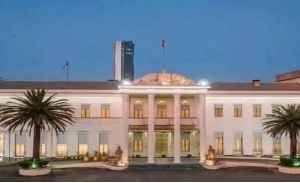Wondimagegnehu Mersie (PhD) is an Associate Dean and Director of Research for Agricultural Research at Virginia State University, Petersburg VA USA. He had obtained Post Doc. in 1988 from University of Florida, Lake Alfred (Weed Science), PhD. in 1985 from Virginia Tech, Blacksburg (Plant Physiology/Weed Science), M.S. in 1981 from University of Reading, United Kingdom (Crop Protection) and B.S. in 1977 from Addis Ababa University, Ethiopia (Plant Science). He had also been leading a significant project that has introduced two control methods on the invasive plant, Parthenium known in Afaan Oromoo as farmasissa. One is a beetle that feeds on farmasissa leaves while the other is a weevil that bores the stem and kills it from the inside. Dr. Wondimagegnehu is our guest on today’s publication.
Herald: How is professional life abroad?
Wondimagegnehu: My professional life abroad is good. I like my job. I get to use what I learned in school at my work.
Herald: Would you tell us about your own educational experience, how you came to be the person who you are now including your childhood?
Wondimagegnehu: I was born and raised in Harar town. I received quality education in elementary as well as high school in Harar. I did my B.S. at Haile Selassie University College of Agriculture at Alemaya. The education offered in the college was also high quality with very high standard.
Herald: Could you tell us about exemplary personal and collaborative efforts and contributions you made for the development of Ethiopia’s and Africa’s Agriculture?
Wondimagegnehu: For the last fifteen years I had led a project to contain the adverse impacts of the invasive plant known as Parthenium or farmasissa (meaning sign away your land). The project has introduced biological agents that only feed on the Parthenium. We have shown success around Arba Minch and other areas. An article had been published recently on The Ethiopian Herald about the effort to control this scourge that reduces yield of major food crops including Teff, make human and livestock sick and displace native Ethiopian plants.
Herald: What are the most critical issues that Ethiopian scholars abroad would like to talk about and consider as basic issues that they can contribute to address?
Wondimagegnehu: Many only talk about politics. But, if they use their technical knowledge to help Ethiopia, that will be more useful than simply focusing on politics.
Herald: Why do most of Ethiopian scholars choose to deliver their intellectual wisdoms outside the country most of the past years?
Wondimagegnehu: Many left years ago because conditions were not favorable to work in their profession and raise families peacefully.
Herald: What do you think about the current locust swarm affecting some parts of the country, what should have been done, what should be done at current status?
Wondimagegnehu: Many of us familiar with the locust are surprised by the outbreak. The key to controlling locust is an effective forecasting system that accurately predict where and when a swarm is starting. Once that is known it is easy to control it where it is breeding before it starts to fly. Once it starts migrating from its breeding ground, it is very difficult to control it.
Herald: How do you assess the overall reform that is going throughout the country and your suggestions to the current challenges?
Wondimagegnehu: The reforms that started in April 2018 are good. I hope they will prove successful. But, challenges remain especially the divisions among ethnic groups. Everybody should work towards peaceful coexistence and observe the rule of law.
The Ethiopian Herald Sunday edition December 22/2019
BY HENOK TIBEBU




